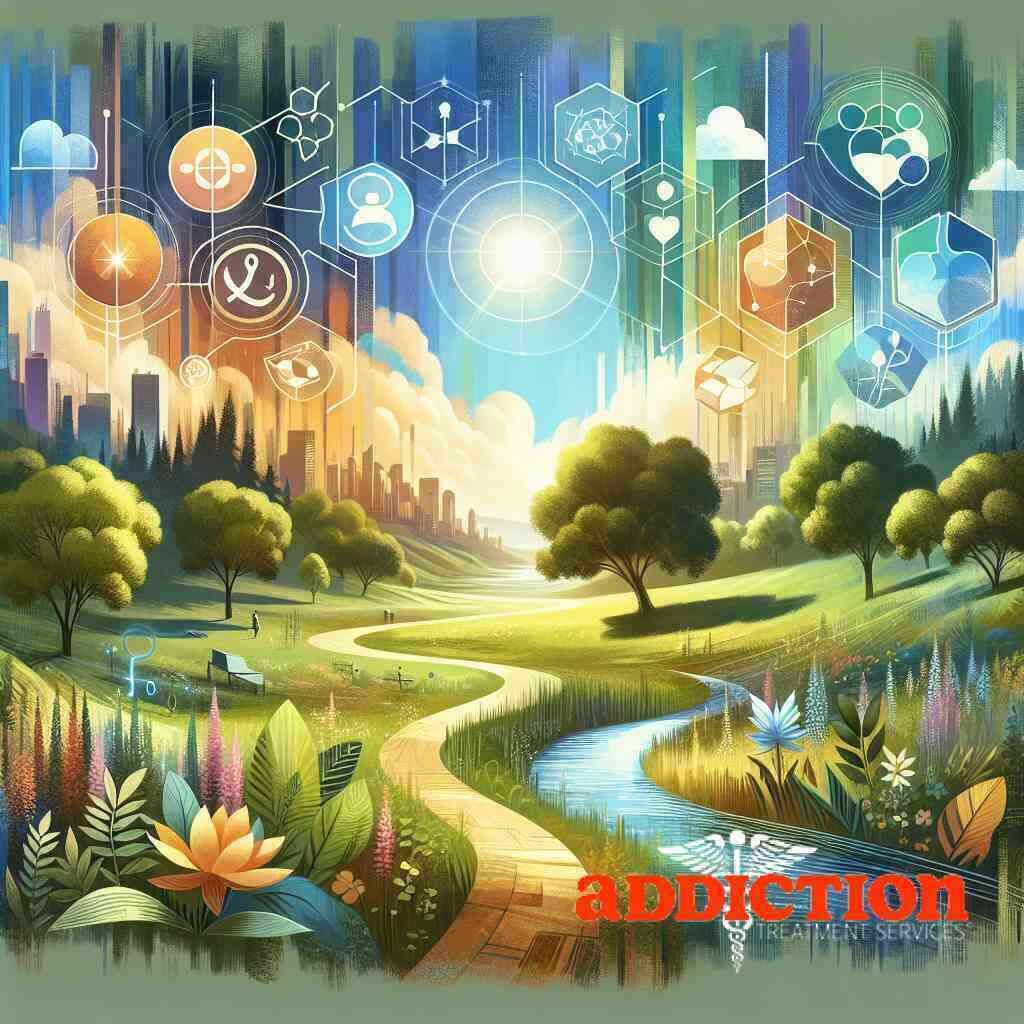 Posted On: 06/24/2025
Posted On: 06/24/2025Navigating the Future Landscape of Addiction Recovery
Understanding the Evolution of Addiction Treatment
The evolution of addiction treatment has been a pivotal journey in tackling substance use disorders over recent decades. As we approach 2025, we continue to see innovative addiction treatment strategies shaping the landscape of recovery. Clinicians and researchers are focusing on new methods that consider the complexities of addiction beyond mere physical dependency. The integration of drug detoxification processes that ease withdrawal symptoms has become crucial, forming the foundation of effective treatment programs. Alongside detoxification, therapies promoting mental health resilience, such as psychotherapy in addiction recovery, are increasingly being recognized as essential elements of comprehensive care. This evolution aims to address not only the physical symptoms but also the emotional and psychological facets, thus offering a more holistic approach.
Mapping Emerging Trends in 2025
Emerging trends in addiction recovery are increasingly focusing on personalized and adaptive care modalities, navigating local addiction treatment resources near you. The year 2025 is expected to see a rise in exploring holistic treatment methods, strategies that encompass mind, body, and spirit integration. These methods not only honor the individuality of each recovery journey but also ensure sustainable recovery by addressing underlying psychological factors. There is a growing emphasis on evidence-based recovery methods, which rely on validated therapeutic practices to enhance recovery outcomes. These trends are mapping a future where treatment is precisely tailored to individual needs, fostering long-lasting recovery success. The focus remains on personalized recovery on care solutions, ensuring that each patient’s unique challenges and strengths are recognized and utilized effectively.
The Role of Technology in Modern Recovery
Technology’s role in modern recovery is transforming how addiction treatment is delivered and accessed. Virtual support and telehealth addiction treatment services are breaking barriers of geographical constraints, allowing individuals to access help from anywhere in the world. The use of technology is not just limited to remote therapy sessions; it also encompasses comprehensive recovery metrics that enhance treatment efficacy. These metrics, collected and analyzed through sophisticated software, are invaluable for tailoring interventions and tracking progress. Moreover, digital platforms are fostering community-based recovery strategies by facilitating connections with support networks crucial to the recovery continuum of care. This technological integration represents a paradigm shift towards a future where recovery is more accessible, individualized, and data-driven.
Innovative Strategies for Enhanced Recovery Outcomes
Personalized Recovery Approaches and Their Impact
In 2025, addiction treatment continues to embrace personalized recovery on care solutions that profoundly impact recovery outcomes. Personalized recovery acknowledges the unique challenges each patient faces and tailors treatment plans to leverage individual strengths. This approach maximizes the efficacy of addiction recovery services by focusing on personal needs, preferences, and specific circumstances of the individual. By fostering a supportive environment, patients are more inclined to participate actively in their recovery process, yielding higher success rates. As these strategies become more refined, they integrate insights from mental health professionals and family involvement to build resilience against relapse and enhance long-term recovery prospects.
Holistic Recovery Methods: Integrating Mind, Body, and Spirit
Holistic recovery methods have gained traction for their integrative focus on mind, body, and spirit. These strategies include exploring addiction treatment services in California, which incorporate various therapies, such as meditation, yoga, and nutrition counseling, aimed at treating the whole person. By addressing the root causes of substance use disorders, holistic approaches enable clients to reconnect with themselves and their surroundings, facilitating deeper healing. These methods are gaining prominence in substance misuse treatment facilities across the nation, highlighting the shift toward comprehensive care. Emphasizing holistic therapies improves mental health services by promoting balanced living as a cornerstone of recovery achievements, exploring advanced sober living and lifestyle techniques.
Evidence-Based Treatment Strategies for Sustainable Recovery
Evidence-based recovery methods have emerged as foundational components of sustainable recovery. Grounded in scientifically validated techniques and therapies, these strategies enhance addiction recovery services through proven practices such as cognitive-behavioral therapy (CBT) and medication-assisted treatment. By focusing on evidence-based approaches, treatment facilities can offer interventions with a higher likelihood of long-term success. This method not only optimizes treatment efficacy but also supports mental health resilience among those affected by substance abuse. As research continues to inform these practices, the shift toward data-driven solutions helps minimize the risk of relapse while maximizing patients’ chances for sustained recovery.
Adapting to New Treatment Methodologies
Adapting to innovative treatment methodologies is crucial for meeting the evolving needs of those in recovery. Addiction treatment advancements in 2025 are marked by a focus on flexible and adaptive therapeutic approaches, which are crucial to connecting more effectively with individuals at different stages of their recovery. This adaptability is evident in integrated treatment models in Massachusetts, where diverse therapeutic practices are combined to address co-occurring disorders seamlessly. The incorporation of advanced treatment methodologies in New York into care plans reflects an overarching industry trend towards dynamic, patient-centered solutions. By continuously evolving and adapting, addiction treatment centers can provide more comprehensive and effective recovery solutions tailored to each patient’s journey.

Leveraging Technology and Community for Recovery Success
Virtual Support and Telehealth Addiction Treatment Services
As we advance towards 2025, virtual support and telehealth addiction treatment services are proving transformative in breaking down traditional barriers to addiction recovery. These innovative strategies for recovery outcomes enable individuals to access care regardless of their location, creating a more inclusive treatment environment. This approach is especially beneficial for those unable to attend in-person sessions due to geographical or personal constraints. By utilizing digital platforms, addiction treatment centers are expanding their reach, providing critical support and guidance through remote therapy and online meetings. This ensures continuous engagement and connection with skilled therapists, significantly contributing to personalized recovery approaches.
Harnessing Recovery Metrics to Optimize Treatment Efficacy
The utilization of recovery metrics is central to optimizing treatment efficacy in modern addiction recovery frameworks. These comprehensive data analyses provide insights into patient progress and treatment effectiveness, allowing for personalized adjustments to care plans. Through recovery metrics 2025, treatment facilities can identify patterns and trends that inform evidence-based treatment strategies. As we focus on addiction recovery outcome optimization, the use of technology-driven analytics becomes a cornerstone in tailoring interventions to the unique needs of each individual. This data-driven approach not only enhances the recovery process but also increases success rates in recovery treatment by fine-tuning therapeutic methodologies to align with patient progress.
Community-Based Recovery Strategies: Building Support Networks
Community-based recovery strategies play a crucial role in building robust support networks essential for sustaining long-term recovery. Emphasizing holistic recovery methods, these strategies foster connections among peers and family members, creating an environment of mutual support and understanding. The sense of community generated through these networks is invaluable, offering encouragement and accountability that bolster the recovery continuum of care. By building these networks, individuals can access a range of recovery support services, from NA meetings to peer-led initiatives that reinforce the importance of shared experiences. Community engagement not only enhances the effectiveness of addiction treatment services but also promotes lasting recovery by empowering individuals to navigate complex recovery challenges in supportive settings.
The Continuum of Care: Ensuring Long-Term Success
The continuum of care is pivotal in ensuring long-term success in addiction recovery, focusing on seamless transitions between different levels of care. This approach integrates various therapies and support systems into comprehensive treatment programs that address the multifaceted nature of substance use disorders. With a strong emphasis on relapse prevention strategies for the modern era, the continuum of care encompasses early intervention, outpatient treatment, intensive outpatient programs, and residential treatment options. By offering adaptive recovery solutions, addiction treatment facilities ensure that patients receive the appropriate level of care throughout their recovery journey. This method fosters sustained recovery by aligning treatment services with evolving patient needs, optimizing outcomes through continuity and adaptability within the treatment framework.
In crafting a comprehensive recovery plan for 2025, these strategies emphasize the vital role of technology and community in fortifying the recovery process, thus paving the path to profound and lasting change.
Crafting a Comprehensive Recovery Plan for 2025
Relapse Prevention Strategies for the Modern Era
In laying the groundwork for successful recovery outcomes in 2025, developing robust relapse prevention strategies is paramount. These strategies uniquely blend traditional practices with modern innovations, emphasizing proactive measures to mitigate risks. Integration of community-based recovery strategies offers a support system that fortifies individuals against common triggers. By utilizing digital tools and telehealth addiction treatment services, patients gain consistent access to support, even beyond traditional settings. Regular assessment of addiction recovery outcome optimization through data analytics ensures timely interventions that align with individual progress, minimizing relapse risks.
Involvement of family members and community plays a critical role in solidifying these strategies, as their support adds layers of accountability and encouragement. Moreover, combining therapeutic interventions with lifestyle modifications-such as exercise and nutrition-forms a holistic arsenal against relapse. By weaving these elements into a cohesive plan, treatment facilities create pathways that not only address immediate recovery goals but also safeguard long-term sobriety.
Patient-Centered Planning and Outcome Optimization
Patient-centered planning stands at the heart of effective outcome optimization in addiction treatment. This approach prioritizes personalization by aligning care plans with individual goals and circumstances, enhancing engagement and accountability in the recovery process. By employing an integrative model that combines therapy innovations and evidence-based recovery methods, treatment centers cater to diverse patient needs, ensuring maximal therapeutic efficacy.
Incorporating feedback mechanisms and regular progress evaluations enables clients to actively participate in shaping their recovery narrative. This dynamic planning fosters resilience, empowering patients to take charge of their journey. Additionally, the continuous evolution of care plans ensures they remain responsive to changing needs, optimizing outcomes by retaining focus on long-term well-being.
Inspiring confidence and self-efficacy in patients can significantly enhance success rates in recovery treatment. Thus, patient-centered care becomes not just a methodology but a philosophy that transforms addiction treatment landscapes by encouraging sustained recovery and personal growth.
Adaptive Recovery Solutions: Responding to Dynamic Needs
Recovery solutions in 2025 necessitate adaptive strategies that respond to individuals’ dynamic needs. These adaptive recovery solutions thrive on flexibility, allowing treatment modalities to evolve in tandem with client progress. By utilizing integrated treatment models in Massachusetts, facilities harness a multifaceted approach that seamlessly transitions patients across various levels of care, catering to shifting needs.
The utilization of advanced treatment methodologies in New York underscores the focus on adaptability. A myriad of therapeutic techniques are presented, reshaped continually based on patient feedback and clinical findings. This responsiveness is crucial in navigating complex recovery challenges, offering proactive path adjustments and tailored interventions.
Specialized programs such as intensive outpatient care and personalized treatments are emphasized to address co-occurring disorders, demonstrating a commitment to comprehensive, adaptable care. This methodology ensures that the recovery journey remains fluid and effective, emphasizing sustained patient success through a highly individualized and evolving treatment landscape.

Conclusion: Paving the Path to Recovery Success
Reflecting on the Road Ahead
As we look towards 2025, the landscape of addiction treatment is undergoing transformative changes that promise to revolutionize recovery success. The evolving frameworks are characterized by innovative approaches that marry technology with personalized care, such as telehealth services and data-driven recovery metrics. These advancements offer unprecedented opportunities to enhance the accessibility and effectiveness of addiction treatment services. It is essential to recognize the significant impact of addiction treatment advancements in 2025, which bring a renewed focus on holistic recovery methods and evidence-based practices. The continuous evolution in treatment methodologies calls for a reimagined approach that places patient success at the forefront, fostering resiliency, connection, and holistic well-being for those on their journey to recovery.
Committing to a Future of Optimized Recovery Outcomes
The commitment to optimized recovery outcomes is rooted in embracing both innovation and tradition. As we prepare for the complex challenges of tomorrow, adopting adaptive and patient-centered care solutions will be key to overcoming obstacles in addiction recovery. This commitment involves not only leveraging groundbreaking treatment strategies but also ensuring that community-based support systems are robust and ever-present. By doing so, we create a safety net that empowers individuals to maintain sobriety and thrive in their post-recovery lives. The goals are clear: to enhance patient care through strategic planning, innovation, and community engagement, thus paving the path to success in addiction recovery. As addiction treatment services continue to redefine and elevate recovery standards, a promising future awaits those seeking a new beginning beyond addiction. Let’s commit to building a vibrant, supportive ecosystem that makes lasting recovery achievable for all.
Frequently Asked Questions
Question: How can virtual addiction support enhance recovery outcomes in the Strategies to Optimize Recovery Outcomes in 2025?
Answer: Virtual addiction support is revolutionizing the way recovery services are accessed, making significant strides in Strategies to Optimize Recovery Outcomes in 2025. At Addiction Treatment Services, we understand the barriers that physical distance can create. By leveraging telehealth addiction treatment services, we provide a flexible, accessible platform for those seeking addiction treatment services near them or from afar. This approach ensures consistent support, allowing individuals to engage in therapy sessions and recovery support services from the comfort of their homes. With innovative treatment methodologies, our virtual support aids in overcoming geographical limitations, offering a lifeline to those who may struggle to access traditional in-person services. This empowers individuals on their recovery journey, enhancing their chances of sustained success.
Question: What role do holistic recovery methods play in achieving successful recovery outcomes?
Answer: Holistic recovery methods form an essential component of achieving successful recovery outcomes by addressing the interconnectedness of mind, body, and spirit. At Addiction Treatment Services, we advocate for a comprehensive approach that incorporates therapies such as meditation, yoga, and nutrition counseling. These methods aim to treat the whole person, going beyond simply addressing the symptoms of addiction. By integrating these practices, we help individuals reconnect with themselves, fostering deeper healing and facilitating a comprehensive recovery process, which makes addiction treatment unique. Our addiction treatment centers offer an array of personalized recovery approaches tailored to the needs of each client, ensuring they receive effective recovery planning available.
Question: How does personalized recovery planning contribute to optimizing recovery strategies?
Answer: Personalized recovery planning is at the heart of optimizing recovery strategies. With a focus on patient-centered recovery planning, Addiction Treatment Services ensures that each individual’s unique challenges and strengths are recognized, with an understanding behavioral health services impact. By developing care plans that resonate with personal goals and circumstances, we increase engagement, accountability, and success rates in recovery treatment. Our therapy innovations in addiction recovery leverage evidence-based treatment strategies to provide interventions that are scientifically proven to yield positive outcomes. This patient-centric approach allows us to provide tailored support and create an environment conducive to long-term recovery success.
Question: What evidence-based treatment strategies are available to support long-term recovery plans?
Answer: Evidence-based treatment strategies provide a robust framework for supporting long-term recovery plans by relying on scientifically validated therapies such as cognitive-behavioral therapy (CBT) and medication-assisted treatment. At Addiction Treatment Services, our addiction treatment centers utilize these proven methods to create effective recovery planning tailored to individual needs. We integrate recovery metrics 2025 into our approach, allowing for data-driven insights that inform treatment adjustments to enhance treatment efficacy. This commitment to evidence-based practices ensures that individuals receive interventions with high success rates in recovery treatment, fostering mental health resilience and minimizing the risk of relapse.
Question: How does technology in addiction recovery aid in building a recovery continuum of care?
Answer: Technology in addiction recovery plays a pivotal role in building a seamless recovery continuum of care by facilitating connections and providing ongoing support. At Addiction Treatment Services, we employ advanced recovery methodologies to integrate digital platforms that break down traditional barriers and make recovery services more accessible. Our telehealth addiction treatment services enable real-time interactions and virtual support, ensuring continuity of care across various levels of treatment through navigating the rise of e-therapy with ATS. This technological integration aids in recovery outcome optimization by allowing for the tracking of progress and immediate intervention when necessary. Through technology-driven platforms, we cultivate a supportive community that enhances the recovery process, making long-term success achievable.


